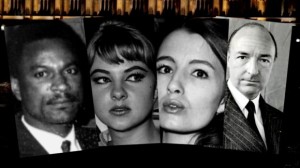The West End success of the play Stephen Ward recalls the scandalous mistrial in 1963 of the trendy osteopath that prompted Ward’s suicide. Luckily, to remind us of the gross injustice meted out by the Judge, Alfred Denning, we have a review in the Aylesford Review by the maverick Carmelite monk Brocard Sewell, of Ludovic’s Kennedy’s revelatory Trial of Stephen Ward (1964).
Denning was a clever man with a first class degree in mathematics, but it is generally acknowledged that many of his judgements and pronouncements in court and outside, lacked a degree of humanity and empathy, qualities that seem to have diminished still further with age. He may, of course, have suffered from Asperger’s Syndrome at a time when this condition was little understood. He was 65 at the time of the Ward trial and he continued as a senior judge until asked to stand down because of his great age. Nor did the prosecution and police ( quelle surprise) come out of the matter with any plausibility. In fact, according to Father Sewell, ‘few of the people concerned in the trial emerge with credit ‘.
To Sewell, Denning proved himself to be anything but the impartial weigher of evidence and sifter of facts that his profession demanded of him. Instead of allowing the prosecution to ask the necessary questions of the police witnesses he intervened by asking the same witnesses exactly the same questions himself, thus telling the jury obliquely that ‘in the judge’s view Herbert and Burrows were men whose word was to be trusted’.
According to Sewell Denning’s summing up was also a blatant attempt to influence the jury. When he pointed out to the jury things in Ward’s favour he assumed a flat, matter of fact tone. This contrasted with the animated voice that held the attention of the court when he emphasised matters that told against the defendant. Denning was aided in his bigotry by an equally reactionary prosecutor in Griffith Jones, who by his prudery at the trial of Lady Chatterley’s Lover in 1960 had already drawn on himself ‘ the ridicule of nations ‘. According to Kennedy, the vivid picture that he drew in court ‘was not one that was even recognisable from the evidence we had heard’.
But Sewell reserved the bulk of his scorn for the police:
‘The behaviour of the police throughout, both at the trial and beforehand, was exactly what one has come to expect. The system of which they are a part almost compels the police to dishonesty and abuse of power. Witnesses at the trial of Stephen Ward, as at many another trial, had been ‘persuaded‘ into saying what the policed wanted then to say ‘.
Sewell concludes his review by asking who was responsible for initiating action against Ward, who after all, wasn’t tracked down by the police as a criminal , but had been chosen by someone unknown for investigation by the police so that he might be charged with ‘something or anything’. This reminds us, of course, of the now discredited police investigation of Sir Edward Heath, who, unlike Ward, couldn’t be prosecuted because he was dead. In fact, Kennedy believed that no one person was involved in scape-goating Ward. The establishment have always recognised that a sensational trial would turn public attention away from a collapsing administration. Sewell however, believed that the decision not to grant Kennedy a transcript of the trial must have originated with an individual high up in government who knew of Kennedy’s reputation for revealing unwelcome truths. Plus ca change.
Incidentally, Father Brocard Sewell (1912 – 2000) was a very unusual Friar. An active member of the Carmelite community at Aylesford, Kent until he was thrown out for opposing the Pope’s line on birth control, he was a literary figure who began as a printer with Dominic Pepler at the Ditchling Press and went on to specialise in such figures of the 1890s as John Gray, Baron Corvo and Montague Summers. He became a friend of extreme right wing novelist Henry Williamson, was inspired to become a Distributist through working as a youth with G.K.Chesterton, but according to one source, also joined the British Union of Fascists and indeed wrote a biography of the right wing theorist Cecil Chesterton, brother of G.K. Later in life he encouraged young poets, notably Frances Horowitz. More pointedly, he also befriended Christine Keeler and, as we have seen, was a harsh critic of the way the Profumo affair was handled by the authorities. A more multi-layered non PC figure could hardly be imagined. If any in the Jotosphere can tell us more, please do. [RMH]


Denning acquired still greater notoriety by his reasons for rejecting appeals after it was revealed that the Birmingham Six and the Guildford Four had been beaten into confessing: ‘If they won, it would mean that the police were guilty of perjury; that they were guilty of violence and threats; that the confessions were involuntary and improperly admitted in evidence; and that the convictions were erroneous. … That was such an appalling vista that every sensible person would say, “It cannot be right that these actions should go any further.”; and ‘It is better that some innocent men remain in jail than that the integrity of the English judicial system be impugned.’
So much for ‘Fiat iustitia, et pereat mundus’.